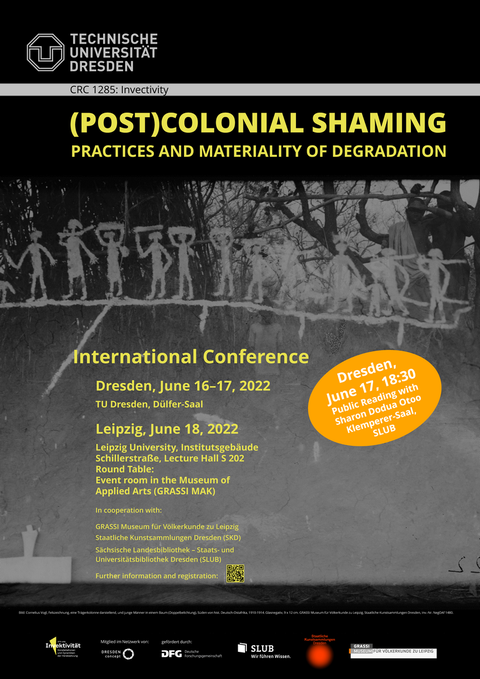02.12.2021 - 04.12.2021; Tagung
(Post)koloniales Shaming. Praktiken und Materialitäten der Herabsetzung

Bild: Cornelius Vogl, Felszeichnung, eine Trägerkolonne darstellend, und junge Männer in einem Baum (Doppelbelichtung), Süden von hist. Deutsch-Ostafrika, 1910-1914. Glasnegativ, 9 x 12 cm. GRASSI / SKD, Inv.-Nr. NegOAf1480.
Emotionsbasierte Praktiken wie shaming, Demütigungen und Diskriminierungen standen im Zentrum der Etablierung und Verfestigung kolonialer Machtgefüge. Positionierungen, Gruppenzugehörigkeiten und asymmetrisierende Kodierungen wurden innerhalb kolonialer Kontexte dabei nicht allein durch menschliche Akteur:innen hergestellt: Auch Dinge waren während des europäischen Kolonialismus des späten 19. und des 20. Jahrhunderts integrale Bestandteile herabsetzender Praktiken. Deren Materialität etwa als Gebrauchsgegenstände mit alltags- oder ritualbezogenen Nutzungen wurde innerhalb solcher Praktiken einer veränderten Ingebrauchnahme zugeführt, mit neuer Bedeutung beladen oder divers affiziert: Waffen und gehandelte (Kolonial)Waren wurden bspw. zu Vehikeln emotionsgeladener politischer Strategien. Alltagsdinge, rituelle Gegenstände und Kunstobjekte, aber auch Architekturen und Infrastrukturen eines Ortes/Raumes manifestierten grundsätzlich tradierte oder neu konfigurierte Machthierarchien. Bilder und Texte waren über ihre inhaltlich-ästhetischen Dimensionen hinaus mittels ihrer materiellen Aspekte – beispielsweise in Gestalt fotografischer Postkarten – ebenso Teil herabsetzender Praktiken. Solche Objekte mit Kolonialbezug können noch heute, etwa durch die Verwendung in Bildungs- und Erinnerungskontexten, Beschämung perpetuieren und immer wieder neu aufrufen, wie z.B. die aktuelle Restitutionsdebatte zu den Beninbronzen verdeutlicht.
Die Delokalisierung von Alltagsgegenständen, die aus ihrem kulturellen Gebrauchskontext herausgenommen und in Kolonialausstellungen in Europa inszeniert wurden, versah diese Exponate mit einer zeichenhaften Valenz. Sie erlaubte es dem europäischen Publikum, die eigene kulturelle Überlegenheit zu konstruieren. Abbildung von Menschen und Dingen aus den Kolonialgebieten ordneten in europäischen Bild- und Textmedien den Kolonisierten koloniale Rollen zu. Damit wurden auch den Dingen Bedeutungen eingeschrieben, die bei der Herstellung und Verfestigung kolonialer Herrschaft mitwirkten. So hatte die Fotografie in kolonialen Kontexten maßgeblichen Anteil an der Produktion einer westlichen Vorstellung des „Primitiven“ bzw. des kolonialen „Exotischen“. Transferprozesse und Bedeutungswandel charakterisieren schließlich das postkoloniale Fortleben von kolonial geprägten Dingen, Menschen, Macht und Wissen. Historisch und/oder kulturell wechselnde Kodierung eliminieren sich nicht gegenseitig, sondern überlagern sich und prägen das post/koloniale ‚Leben der Dinge’ weiter. Daraus ergeben sich vielfältige Probleme im Zusammenhang mit kolonialen Objekten und Referenzen. Aus heutiger Perspektive ist dabei bspw. zu diskutieren, ob und wie ein nicht herabwürdigender Umgang mit Objekten und Praktiken möglich scheint, denen Herabwürdigung durch koloniale Ingebrauchnahme bereits tief eingewoben ist.
Diese Tagung des SFB 1285 "Invektivität. Konstellationen und Dynamiken der Herabsetzung" der TU Dresden zielt darauf ab, besser zu verstehen, wie Herabsetzung, Demütigung und Bloßstellung als Bestandteile materieller kolonialer Praktiken die koloniale Politik des shaming mit geformt und als Komponenten kultureller Erinnerung aller beteiligten kulturellen Gruppen bis in die postkoloniale Gegenwart verstetigt haben:
- Analytisch untersucht die Tagung emotionale Praktiken der Herabwürdigung und die involvierten Materialitäten mit dem Konzept der „Invektivität“. Damit werden unterschiedliche Phänomene der Schmähung, Beschämung und Herabsetzung zusammengefasst, die als eine epochen- und kulturübergreifende Form der Kommunikation verstanden werden. Uns interessieren historische Dynamiken kolonialer Neukodierungen ebenso wie Delokalisierungen kolonialer „Fundstücke“ samt veränderter Sinnzuschreibungen, oder aber Wiederaneignungen etwa von „Raubkunst“ bis in die postkoloniale Gegenwart hinein. Durch interdisziplinäre Zugänge soll der in dieser Form bisher nicht thematisierte Zusammenhang zwischen materiellen Dingen aus kolonialen Kontexten und deren Funktion als bis heute wirkende Medien der Invektivität in den Fokus gerückt werden.
- Die Fragestellung wird aus kulturwissenschaftlich–historischer sowie museologischer Perspektive diskutiert. Dabei liegt der Fokus zum einen auf den Möglichkeiten und Grenzen einer kritischen Analyse kolonialer Praktiken mit Blick auf einen ethisch angemessenen, nicht fortgesetzt herabwürdigenden Umgang mit kolonialen „Aneignungen“ materieller oder materialisierter Objekte. Zum anderen fragen wir nach den Möglichkeiten der Realisierung des Ansatzes eines „geteilten Erbes“ (shared heritage) und dessen praktischen Konsequenzen. Dies knüpft an aktuelle Debatten um Diskriminierung und Erinnerungskultur an, die fragen, wie Gesellschaften einen angemessenen Umgang mit gewaltbegleiteten invektiven Praktiken vergangener Zeiten pflegen können, der nicht durch Ignoranz, Verdrängen und Fortsetzung kolonialen otherings geprägt ist.
Aus diesem Grunde kooperiert der SFB 1285 in dieser Tagung inhaltlich wie räumlich mit dem GRASSI Museum für Völkerkunde zu Leipzig, das parallel zur Dresdner Tagung unter dem Titel Reinventing Grassi.SKD in Leipzig die neue Sammlungsdisposition eröffnet (02.-05.12.2021). Die Dresdner SFB-Tagung wird täglich in einem Raum des GRASSI in Leipzig digital mitzuverfolgen sein. Das Leipziger GRASSI-Art-Event am Freitag, dem 03.12.2021, wird ab 17.00 Uhr in die Dresdner SFB-Tagung übertragen. Am Samstag, dem 04.12., werden wir schließlich beide Veranstaltungen auch räumlich zusammenführen und mit den Dresdner Tagungs-Beteiligten nach Leipzig reisen, um Samstag Abend im GRASSI unseren Round table Shaming in memory cultures stattfinden zu lassen. Für die SFB-Tagungsteilnehmer:innen wird schließlich am Sonntag Vormittag eine exklusive Führung durch die neue Sammlungsdisposition durchgeführt.
Tagungsprogramm und Anmeldeformular folgen.
